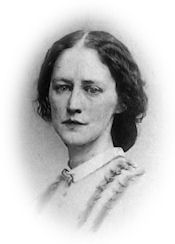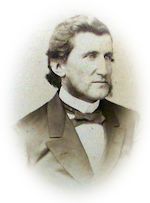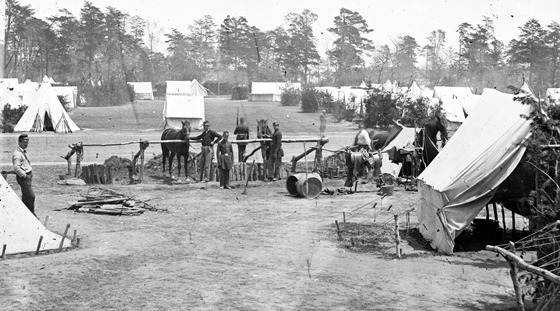 3rd.—Considerable firing, all day, towards Yorktown. Increases towards night. I learn that the heavy firing is mostly by the enemy. Can it be possible that they contemplate an evacuation, and that this firing is to cover their intention? The camp ground we left yesterday is being shelled to-day.
3rd.—Considerable firing, all day, towards Yorktown. Increases towards night. I learn that the heavy firing is mostly by the enemy. Can it be possible that they contemplate an evacuation, and that this firing is to cover their intention? The camp ground we left yesterday is being shelled to-day.
Thursday, May 3, 2012
May 3d. Weather fine and warm again. The colonel and I rode over to Sumner’s headquarters and had a chat with Captain Taylor, the assistant adjutant-general. He is a very pleasant fellow, a swell, a nephew of ex-President Taylor. He told us he thought the bombardment would open the day after to-morrow all along the line, and that the water battery which opened on the first had done much injury to the docks and town and was a great success. He told us also of the landing below Gloucester, on the opposite side of the river, of Franklin’s division. It seems they have been on board transports since the 20th of April and only landed yesterday. The delay, he says, was due to lack of facilities for landing, the engineer corps having more than they can possibly attend to, but there must be some mistake about this, as we landed without engineers, and amongst these regiments there are scores of men familiar with every phase of engineering, and wood choppers, boatmen, and carpenters can be had by simply asking for them in any number. A little less style and more business would be very useful just now to the country. The landing of this division ought to insure the capture of the works on that shore and help our gunboats and vessels immensely. Enjoyed the visit and also the ride home. In the evening sat outside out tents watching the flashes from the enemy’s guns, which were unusually active. To bed late, but not to sleep much, on account of the heavy firing.
Ship Point, May 3, ‘62.
Dear Georgy: The 8th Illinois Cavalry arrived several days ago. They are disembarking today. Cannot the Daniel Webster take the sick off from Ship Point? They will be doing a great service if they can.
 Jane Stuart Woolsey to Joe Howland.
Jane Stuart Woolsey to Joe Howland.
8 Brevoort Place, 3d May, Chi Alpha night.
So you three have met again, Georgy, Eliza and the Colonel. . . . It must have been a jolly meeting for you all on the floating Hospital, and Eliza says you showed symptoms of illness immediately on seeing the comfortable beds. But it is rather a perilous position for the girls. It is no longer visiting, but living, in an atmosphere of infection, day and night, typhoid, rubeola, gangrene, and what not. They will be in for anything going, and the service in a crowded transport will make terrible draughts on the sympathies of all concerned. We hear surmises that the Daniel Webster will come round to New York. If so, I sincerely hope the girls will come in her if possible, if it is only for a day. What an excellent thing to have these boats systematically provided, and to have ladies on board. It will go far to humanize the horrid vehicles. Heavy reproaches belong somewhere for the want of foresight and humanity in the government arrangements of the kind. I have seen it. Send your sick men, if you have any, on a Sanitary Commission transport. Fully half the complaints about the Vermonters of Lee’s Mills are strictly correct, and half are half too many for toleration. The men are in comparative paradise now in “our” (!) hands, though one or two will die in consequence of careless treatment,—Government doings. Somebody says of the barbarisms of the Chinese Tae-Pings: “if you want to complete the picture, transfer them to America and prefix the adjective Red.”
We have been having a Chi Alpha (the Clergymen’s Social Club) for Mr. Prentiss, while he was moving. I say “we” although our participation was through the key-hole alone. The last of the mild elderly gentlemen has taken his hat and cane, and the family have rushed down and wildly consumed vast quantities of sandwiches, chicken salad, and the loveliest fried oysters! Don’t you wish you had some? . . .
One of the entertainments, not edible, was a “James Projectile,” weight 58 lbs., brought in the self-sacrificing and gallant hat box of Chas. Johnson, sent by Frank Bacon as a receipt in full, I suppose, for the few little matters we have sent him from time to time,—filled and covered with the red brick dust made by the great breach.[1]
![]()
“The slave shouts in the barracoon
As through the breach we thunder!”
![]()
But never, Chas. Johnson says, never was there such a disgusted set of men as the Connecticut Seventh, when the white flag went up; they had set their hearts on storming the place, and everything was ready. He went through the casemates with F. B. (Francis Bacon) on his rounds among the patients, his own and those left to his care by Colonel Olmsted, and gave us a very interesting picture of the scene, too long and circumstantial to write out in a letter. He was very much pleased with Dr. Bacon, “so exactly the man for the place,” he said; so utterly cool, so gentle, and so untiring in care and patience. One young fellow they came to, had lost his leg, and the Doctor was trying to soothe him to sleep without an anodyne—“What part of Connecticut are you from?” asked Charles J.; “I’m a Georgian, sir. Yes, sir (kindling up), I fired the last gun from this fort, sir!” “Yes,” said the Doctor quietly, in his mesmeric way, “he stood by his gun till a shot dismounted it and hurt him. But try now to go to sleep, and if you find you cannot, I’ll give you something to help you.” “O, if I could have one drink of milk, Doctor!” “I’ll see; perhaps I can get you a little.” So he gave the candle (in a bottle) to Charles, and was gone for a quarter of an hour, coming back with a little milk in the bottom of a cup, which the young Georgian eagerly swallowed. The story is getting too long—and there were two or three others to match—but what I observe is, that a man of less fine fibre, instead of taking up the talk of the poor Georgian, would have “ improved the occasion” to him.
Did you notice that to-day, in the transactions of the Board of Brokers, when the “Government Sixes touched par,” for the first time since the rebellion, that the brokers were all on their feet in a minute giving three tremendous cheers? . . . Mother seriously announces just here, that two of the tea spoons, used by the clergymen this evening, are missing, and mentions the name of Rev. Dr. _______!
[1]On the newel post at your uncle Frank’s house in New Haven stands this projectile, fired from the battery by which he stood during the attack on Fort Pulaski. It went through the wall, and was taken out of the rubbish inside the fort by him and sent North to your grandmother.
![]()
Apropos of your Uncle Frank’s “improving the occasion” at Fort Pulaski—he did improve it in giving the rebel surgeon a merited rebuke. “Good-bye, my poor fellows,” the surgeon had said, “I don’t know what will happen to you now, I shall have to leave you to this gentleman.” “You need not have any apprehensions, sir,” F. B. answered; “these are not the first wounded Georgians I have had to care for;” and then he told him of the wounded rebels he had looked after at the battle of Bull Run. The fellow melted at once and said those men and Colonel Gardner came into his hands directly from F. B.’s, and he had heard of the kindness shown them.
May 3.—A very warm day. I am obliged to stop writing some letters, as I hear heavy cannonading; the sound makes me quite nervous; this is the first time that I have ever heard firing in battle. I suppose my brother is in it.
Seven o’clock P. M., and a number of wounded have just been brought in. There was a skirmish at the intrenchments. My brother is not hurt, or I should have known it by this time.
Yorktown, Va., vicinity. Headquarters of Gen. George B. McClellan, Camp Winfield Scott
May 3, 1862 – photographed by James F. Gibson.
Part of Civil War glass negative collection. Library of Congress Prints and Photographs Division Washington, D.C. 20540 USA
Record page for this drawing: http://www.loc.gov/pictures/item/cwp2003000026/PP/
May 3.—The rebel steamer Bermuda, laden with arms and munitions of war, was taken into Philadelphia.—Philadelphia Inquirer, May 4.
—The Nashville Union of to-day contains a call, signed by one hundred and fifty influential citizens, assigning Monday, May fourth, for a meeting to take measures to restore the former relations of Tennessee with the Federal Union.
—General Paine’s division of the Union army of the south-west, sent out by General Pope to reconnoitre, found the enemy near Farmington, Mississippi, about four thousand five hundred in number, and in a strong position. General Paine, after a sharp skirmish, drove them from their position, and captured their camp.—(Doc. 4.)
—At Liverpool, England, Captain William Wilson, of the ship Emily St. Pierre, was presented by the merchants and mercantile marine officers of that place, with a testimonial for his gallantry on the twenty-first of March, in recapturing his ship, which was seized by the United States gunboat James Adger, three days previous, off Charleston, S. C.—London Times, May 4.
—The rebels evacuated Yorktown and all their defences there and on the line of the Warwick River, at night. They left all their heavy guns, large quantities of ammunition, camp equipage, etc., and retreated by the Williamsburgh road.— (Doc. 5.)
—The United States gunboat Santiago de Cuba brought into the port of New-York, as a prize, the rebel steamer Ella Warley, captured on her way from Nassau, N. P., to Charleston S. C, laden with arms.
—Jeff Davis proclaimed martial law over the Counties of Lee, Wise, Buchanan, McDowell, and Wyoming, Va.—(Doc. 94.)






